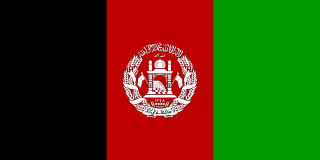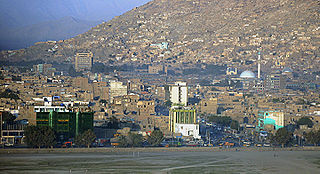
The government of Afghanistan is currently disputed following the effective collapse of the Islamic Republic of Afghanistan during the fall of Kabul to Taliban forces on 15 August 2021 and the subsequent re-establishment of the Islamic Emirate of Afghanistan which now exercises de facto control over most of the country. On 7 September 2021 the Taliban officials in de facto control of most of Afghanistan announced a new interim government headed by Mullah Mohammad Hassan Akhund as Prime Minister. The government is subject to the oversight of the Taliban's Supreme Leader, Haibatullah Akhundzada. As of 8 September 2021, the Islamic Emirate of Afghanistan has not yet been formally recognized as the de jure government of Afghanistan by any other country. The representatives appointed by the Islamic Republic of Afghanistan continue to represent the country at the United Nations. These representatives have refused to recognize the Taliban appointed government and have urged other countries to not recognize this government either.
The Afghan Constitution Commission was established October 5, 2002 as required by the Bonn Agreement, which stipulated that a new Afghan constitution be adopted by a loya jirga. The loya jirga was required to convene within eighteen months of the establishment of Afghan Transitional Administration, which was established by the Emergency Loya Jirga in June 2002. After some delay, the proposed Afghan Constitution was presented to President Hamid Karzai on November 3, 2003. A loya jirga began December 14, 2003 in Kabul and was endorsed January 4, 2004.
Operation Athena was the Canadian Forces' contribution to the International Security Assistance Force (ISAF) in Afghanistan. The operation was divided in two phases: the first one took place from July 2003 to July 2005 in the Kabul region and the second one from August 2005 to December 2011 in the Kandahar area. The operation's main objective was to improve Afghanistan's security and governance. Operation Athena in Kandahar constituted the longest combat mission in the history of Canadian Forces. With over 40,000 Canadian military members that, at some point, entered the country—often several times—this operation constitutes the largest military deployment of the Canadian Forces since World War II.
The Bonn Agreement was the initial series of agreements passed on December 5, 2001 during an international conference on Afghanistan held in Bonn. It was intended to re-create the Islamic State of Afghanistan following the U.S. invasion of Afghanistan that followed the September 11, 2001, terrorist attacks. Since no nationally agreed-upon government had existed in Afghanistan since 1979, it was felt necessary to have a transition period before a permanent government was established. A nationally agreed-upon government would require at least one loya jirga to be convened; however, in the absence of law and order in the wake of the rapid victory of American and Afghan Northern Alliance forces, immediate steps were felt to be required.
A jirga is an assembly of leaders that makes decisions by consensus according to Pashtunwali, the Pashtun social code. It is conducted in order to settle disputes among the Pashtuns, but also by members of other ethnic groups who are influenced by them in present-day Afghanistan and Pakistan.

The Transitional Islamic State of Afghanistan (TISA), also known as the Afghan Transitional Authority, was the temporary transitional government in Afghanistan established by the loya jirga in June 2002. The Transitional Authority succeeded the original Islamic State of Afghanistan and preceded the Islamic Republic of Afghanistan (2004–2021).

The Afghan Interim Administration (AIA), also known as the Afghan Interim Authority, was the first administration of Afghanistan after the fall of the Taliban regime and was the highest authority of the country from 22 December 2001 until 13 July 2002.
Afghan President Hamid Karzai announced the holding of a consultative grand council called the Afghanistan's National Consultative Peace Jirga (NCPJ) or Peace Jirga in his inauguration speech on 19 November 2009, after winning elections for a second term, to end the ongoing Taliban insurgency. At the International Afghanistan Conference in London on 28 January 2010, he announced that the government would hold the event in April or May 2010, intended to bring together tribal elders, officials and local power brokers from around the country, to discuss peace and the end of the insurgency. "Jirga" is a word in the Pashto language that means "large assembly" or "council". It is a traditional method in parts of Afghanistan and Pakistan of resolving disputes between tribes or discussing problems affecting whole communities.

United Nations Security Council resolution 1378, adopted unanimously on 14 November 2001, after reaffirming all resolutions on the situation in Afghanistan, including resolutions 1267 (1999), 1333 (2000) and 1363 (2001), the Council affirmed that the United Nations would play an important role in the country and called for the establishment of a transitional administration leading to the formation of a new government.

United Nations Security Council resolution 1386, adopted unanimously on 20 December 2001, after reaffirming all resolutions on the situation in Afghanistan, particularly resolutions 1378 (2001) and 1383 (2001), the Council authorised the establishment of the International Security Assistance Force (ISAF) to assist the Afghan Interim Authority in the maintenance of security in Kabul and surrounding areas. It was the final Security Council resolution adopted in 2001.

United Nations Security Council resolution 1510, adopted unanimously on 13 October 2003, after reaffirming all resolutions on the situation in Afghanistan, particularly resolutions 1386 (2001), 1413 (2002) and 1444 (2002), and resolutions 1368 (2001) and 1373 (2001) on terrorism, the council extended the authorisation of the International Security Assistance Force (ISAF) for a period of one year and expanded its operations outside the capital Kabul to other areas.

United Nations Security Council resolution 1536, adopted unanimously on 26 March 2004, after reaffirming all resolutions on the situation in Afghanistan, particularly Resolution 1471 (2003), the council extended the mandate of the United Nations Assistance Mission in Afghanistan (UNAMA) for an additional period of twelve months until 26 March 2005.
United Nations Security Council Resolution 1943, adopted unanimously on October 13, 2010, after reaffirming all resolutions on the situation in Afghanistan and terrorism, including resolutions 1267 (1999), 1368 (2001), 1373 (2001), 1386 (2001), 1510 (2003), 1822 (2008), 1833 (2008), 1890 (2009), 1904 (2009) and 1917 (2010), the Council extended the authorisation of the International Security Assistance Force (ISAF) operating in the country for a period of one year.

United Nations Security Council resolution 1589, adopted unanimously on 24 March 2005, after reaffirming all resolutions on the situation in Afghanistan, particularly Resolution 1536 (2004), the council extended the mandate of the United Nations Assistance Mission in Afghanistan (UNAMA) for an additional period of twelve months until 24 March 2006.

United Nations Security Council resolution 1623, adopted unanimously on 13 September 2005, after reaffirming all resolutions on the situation in Afghanistan, particularly resolutions 1386 (2001), 1413 (2002), 1444 (2002), 1510 (2003) and 1563 (2004), and resolutions 1368 (2001) and 1373 (2001) on terrorism, the council extended the authorisation of the International Security Assistance Force (ISAF) until mid-October 2006.

An emergency loya jirga was held in Kabul, Afghanistan between 11 and 19 June 2002 to elect a transitional administration. The loya jirga was called for by the Bonn Agreement and Bush administration. The agreement was drawn up in December 2001 in Germany. Conducted under United Nations auspices, the talks at Bonn sought a solution to the problem of government in Afghanistan after the US ousted the Taliban government.
Afghan leaders who met at the December 2001 Bonn Conference which picked Hamid Karzai to lead the Afghan Transitional Authority also agreed that a Constitutional Loya Jirga should be convened to draft a new constitution.

Zalmai Rassoul is an Afghan politician who served as Foreign Minister of Afghanistan from January 2010 to October 2013. He previously served as National Security Advisor from June 2002 to January 2010. Through his various roles in Government, Rassoul played a key role in building the Afghan security architecture, uniting the international community in support of an Afghan-led and Afghan-owned peace process, strengthening regional cooperation and security through the establishment of the Regional Economic Cooperation Conference on Afghanistan and the Heart of Asia-Istanbul Process, and rebuilding vital industries. He stood as a candidate in the 2014 presidential election. Later, Rassoul was appointed as the Ambassador of Afghanistan to the United Kingdom and Ireland from 2020 to 2024.
Doctor Mahboba Hoqooqmal is an Afghan politician.
The Pashtun National Jirga or Pashtun National Court, also known as the Khyber Jirga, commenced on 11 October 2024 under the leadership of the Pashtun Tahafuz Movement (PTM) in the Khyber District of Khyber Pakhtunkhwa, Pakistan. The jirga was set to address key issues affecting the Pashtuns, including security concerns, political autonomy, and socio-economic challenges in the region of Pashtunistan.











